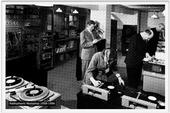Myspace Layouts - Myspace Editor - Image Hosting
This is a tribute to the BBC Radiophonic Workshop and I hope it inspires some new people to investigate the fascinating world of the Radiophonic Workshop.
The BBC Radiophonic Workshop was set-up to satisfy the growing demand in the late 1950s for "radiophonic" sounds from a group of producers and studio managers at the BBC, including Desmond Briscoe and Daphne Oram. For some time there had been much interest in producing innovative music and sounds to go with the pioneering programming of the era, in particular the dramatic output of the BBC Third Programme. Often the sounds required for the atmosphere that programme makers wished to create were unavailable or non-existent through traditional sources and so some, such as the musically trained Oram, would look to new techniques to produce effects and music for their pieces. Much of this interest drew them to musique concrète and tape manipulation techniques, since using these methods could allow them to create soundscapes suitable for the growing range of unconventional programming. When the BBC noticed the rising popularity of this method they established a Radiophonic Effects Committee, setting up the Radiophonic Workshop in rooms 13 & 14 of the BBC's Maida Vale studios with a budget of £2,000. The Workshop regularly released technical journals of their findings - leading to some of their techniques being borrowed by sixties producers and engineers such as Eddie Kramer.
Perhaps the most significant recording in Radiophonic Workshop history came in 1963 when they were approached by composer Ron Grainer to record a theme tune for the upcoming BBC children's television series Doctor Who. Presented with the task of "realising" Grainer's score, complete with its descriptions of "sweeps", "swoops", "wind clouds" and "wind bubbles", Delia Derbyshire created a piece of musique concrète which has become one of television's most recognisable themes. Upon hearing his composition, which was almost unrecognisable when compared to its score, Grainer famously asked "Did I write that?", declaring that Derbyshire deserved half of his royalties although unfortunately due to BBC policy at the time could not receive any. Over the best part of the next three decades the Workshop contributed greatly to the programme providing its vast range of unusual sound-effects, from the TARDIS to the Sonic screwdriver, as well as much of its distinctive electronic incidental music, including every score from 1980 to 1985. Such is the relationship between the two that to many the phrase "Radiophonic Workshop" will always be associated with the programme, often to the detriment of the reputation of the Workshop's other output.
